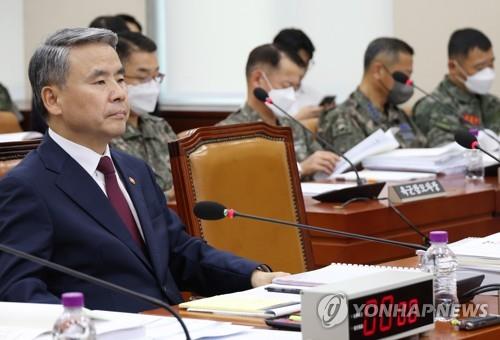- California Assembly OKs highest minimum wage in nation
- S. Korea unveils first graphic cigarette warnings
- US joins with South Korea, Japan in bid to deter North Korea
- LPGA golfer Chun In-gee finally back in action
- S. Korea won’t be top seed in final World Cup qualification round
- US men’s soccer misses 2nd straight Olympics
- US back on track in qualifying with 4-0 win over Guatemala
- High-intensity workout injuries spawn cottage industry
- CDC expands range of Zika mosquitoes into parts of Northeast
- Who knew? ‘The Walking Dead’ is helping families connect
S. Korea, U.S. working together to search for and salvage sunken parts of N. Korea’s space rocket
South Korea and the United States are currently in coordination to search for and salvage the sunken parts of North Korea’s failed launch of a purported space rocket earlier this week, Defense Minister Lee Jong-sup said Friday.
Lee told lawmakers that the allies have been sharing information and coordinating together in the search efforts after the North’s launch of the rocket carrying what it claims to be a spy satellite ended in failure early Thursday.
In a report, the defense ministry said the first stage of the rocket fell into waters west of the Korean Peninsula, while the second stage plunged into waters northeast of the Philippines.
When asked about the search operation, Lee said the military has yet to identify any floating debris from the rocket.
He also said there is evidence to believe that the flight of the rocket’s second stage was “partially abnormal,” compared with the North’s state media report that claimed it was normal and blamed the failure on an error during the third-stage flight.
“It will likely take some time for a final judgment,” Lee said, noting that the state-run Agency for Defense Development and U.S. experts are conducting a detailed analysis.
The ministry assessed that North Korea carried out the launch to make up for its first failed attempt in May and to demonstrate its capabilities and willingness to respond to an ongoing major South Korea-U.S. military exercise and recent efforts for trilateral cooperation among Seoul, Washington and Tokyo.
Lee denounced the North’s launch as a “clear provocation,” noting that it violates U.N. Security Council resolutions banning the North from the use of ballistic missile technology.
He also vowed to strengthen the allies’ combined defense posture through the ongoing Ulchi Freedom Shield exercise, which kicked off Monday and is set to end on Aug. 31.
“By applying scenarios that account for North Korea’s advancing nuclear and missile capabilities in the Ulchi Freedom Shield exercise, our military is focusing on substantively strengthening the South Korea-U.S. alliance’s crisis management and response capabilities and enhancing the combined defense posture,” he said.












